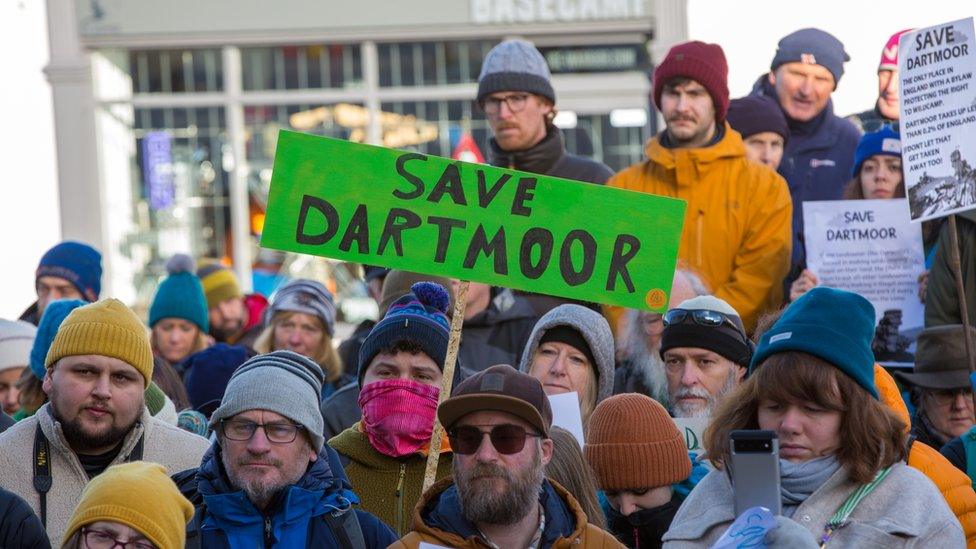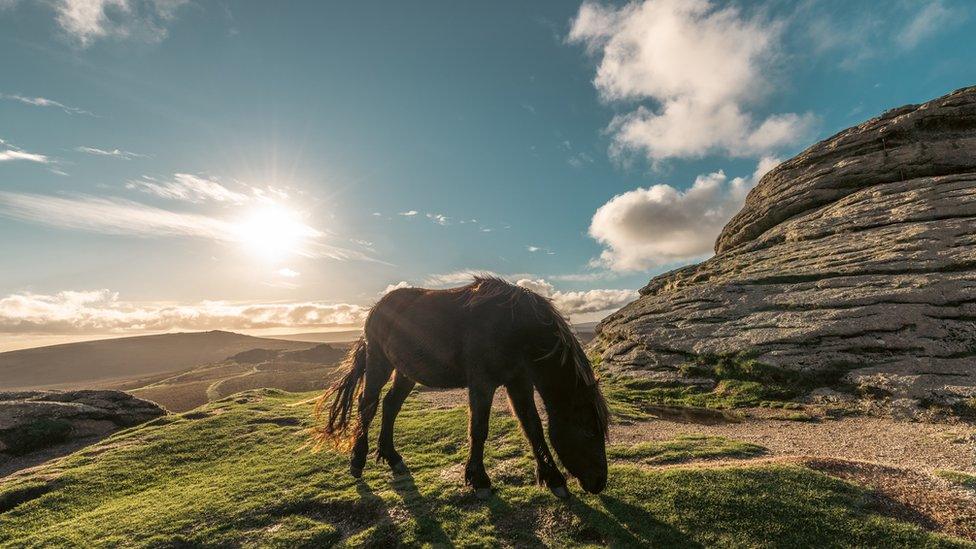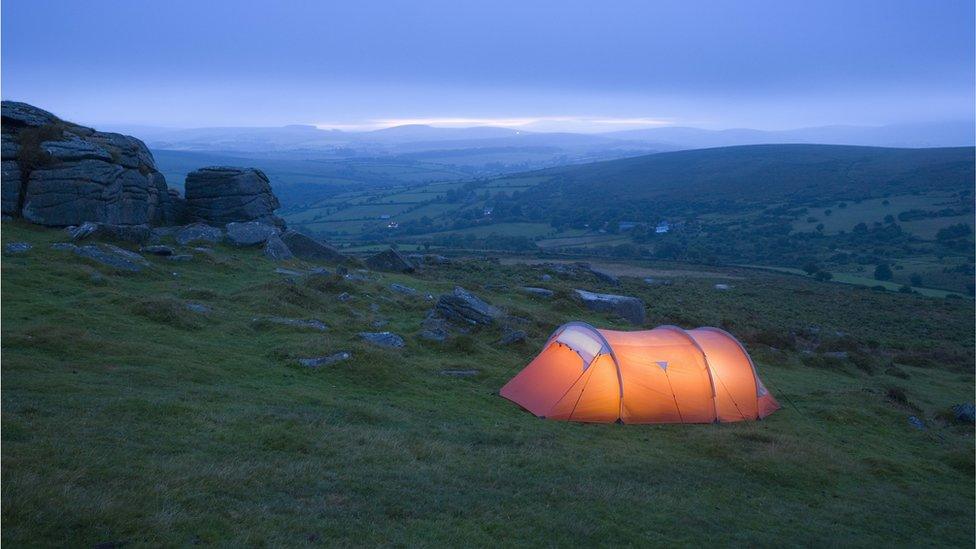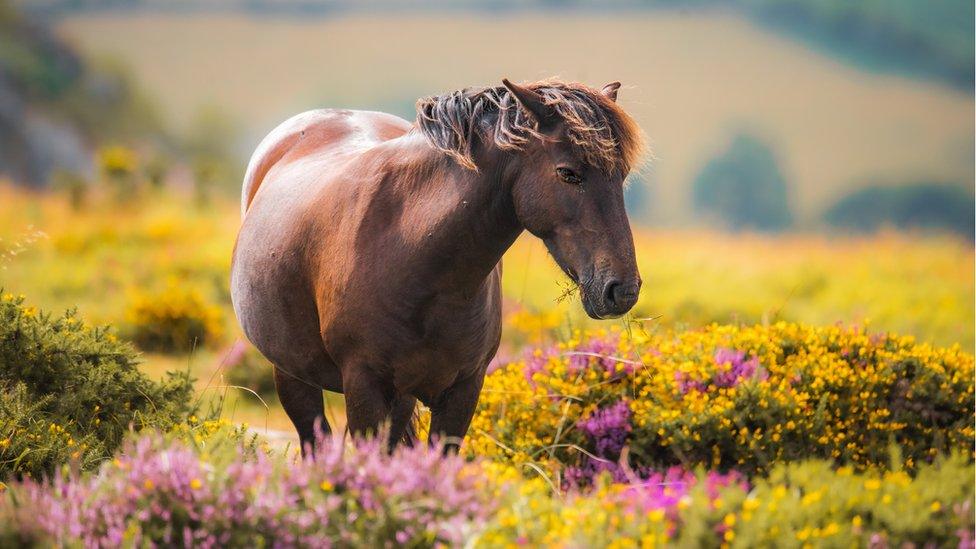Wild campers 'lose 12,000 acres' in Dartmoor deal
- Published

Dozens of Devon residents opposed to court case travelled to London for the hearing last December
Campaigners claim wild campers have lost the freedom to use more than 12,000 acres (49 sq km) of Dartmoor following a new deal struck between park bosses and landowners.
On Friday, a "test case" High Court ruling gave the owner of an estate on Dartmoor the right to "remove" wild campers from their land.
A new agreement means wild camping can continue but campaign group Right to Roam said campers had lost 18% of available land as a result.
Dartmoor National Park Authority (DNPA) said they were "still in negotiations" with landowners.

Dartmoor ponies - that have roamed freely over the land for centuries - are the symbol of the moor
A DNPA spokeswoman told the BBC: "The situation is changing all the time and more landowners could be added next week.
"This is a fluid process and we are working at pace to try and get as much as access as possible."
She said the park was still considering whether to appeal the legal ruling.
But campaign group Right to Roam said there had been an "18% reduction" in land where wild camping used to be permitted, amounting to a loss of 12,580 acres.
Allow X content?
This article contains content provided by X. We ask for your permission before anything is loaded, as they may be using cookies and other technologies. You may want to read X’s cookie policy, external and privacy policy, external before accepting. To view this content choose ‘accept and continue’.
Jon Moses of Right to Roam said: "We call on the Dartmoor National Park Authority to listen to the public outcry on the withdrawal of wild camping rights and appeal last Friday's ruling to ensure that full rights to wild camp on Dartmoor are restored."
At the centre of debate is an "agreement in principle" struck between DNPA bosses and landowners.
Members of the Dartmoor Commons Owners' Association have signed a "permissive agreement" which stops short of making their land a public right of way.
Landowners who have signed up will be paid an unknown sum by the park.
However, some landowners are yet to agree terms for their land.
It means that, whereas before there was an assumed right that people could camp without landowners' permission, they will now be restricted to specific areas.
These areas are marked on an interactive map published on the park authority's website, external.
'No thought'
On Thursday, head teacher Michael Johnson, whose pupils train for the Ten Tors Challenge on the moor, compared the new deals as swapping a Rolls Royce for "a pushbike with flat tyres".
He called for politicians to "intervene" before the park "loses some of its purpose".
Alexander Darwall and his wife Diana, who own the Blachford Estate on Dartmoor, took the case to the High Court on Friday last week, prompting fears about wild camping being banned.
They said it was never their intention to ban camping on Dartmoor, but they wanted to "clarify the law".
They said they were seeking a "mutually-satisfactory arrangement".
Mr Shrubsole called it a "stitched-up deal".
He said: "The public have just had their right to wild camp summarily snatched from them by a wealthy landowner.
"Now we're expected to be grateful to landowners who grant us permission to wild camp - and pay for the privilege."
Before Friday Dartmoor was the only area of England and Wales where under a local law there had been an assumed right to wild camp without the landowner's permission.
It was revealed in December that Dartmoor and Exmoor national parks were considering urgent measures to save money, including redundancies, selling off land and closing visitor centres.

Follow BBC News South West on Twitter, external, Facebook, external and Instagram, external. Send your story ideas to spotlight@bbc.co.uk, external.
- Published19 January 2023

- Published19 January 2023

- Published13 January 2023
